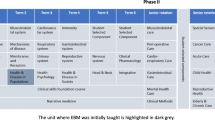ABSTRACT
BACKGROUND
Evidence-based medicine (EBM) is an important element of medical education. However, limited information is available on effective curricula.
OBJECTIVE
To evaluate a longitudinal medical school EBM curriculum using validated instruments.
DESIGN, PARTICIPANTS, MEASUREMENTS
We evaluated EBM attitudes and knowledge of medical students as they progressed through an EBM curriculum. The first component of the curriculum was an EBM “short course” with didactic and small-group sessions occurring at the end of the second year. The second component integrated EBM assignments with third-year clinical rotations. The 15-point Berlin Questionnaire was administered before the course in 2006 and 2007, after the short course, and at the end of the third year. The 212-point Fresno Test was administered before the course in 2007 and 2008, after the short course, and at the end of the third year. Self-reported knowledge and attitudes were also assessed in all three classes of medical students.
RESULTS
EBM knowledge scores on the 15-point Berlin Questionnaire increased from baseline by 3.0 points (20.0%) at the end of the second year portion of the course (p < 001) and by 3.4 points (22.7%) at the end of the third year (p < 001). EBM knowledge scores on the 212-point Fresno Test increased from baseline by 39.7 points (18.7%) at the end of the second year portion of the course (p < 001) and by 54.6 points (25.8%) at the end of the third year (p < 001). On a 5-point scale, self-rated EBM knowledge increased from baseline by 1.0 and 1.4 points, respectively (both p < 001). EBM was felt to be of high importance for medical education and clinical practice at all time points, with increases noted after both components of the curriculum.
CONCLUSIONS
A longitudinal medical school EBM was associated with markedly increased EBM knowledge on two validated instruments. Both components of the curriculum were associated with gains in knowledge. The curriculum was also associated with increased perceptions of the importance of EBM for medical education and clinical practice.


Similar content being viewed by others
REFERENCES
Liaison Committee on Medical Education. Functions and structure of a medical school: standards for accreditation of medical education programs leading to the M.D. degree. Available at: http://www.lcme.org/functions2010jun.pdf. Accessed June 14, 2010
Accreditation Council for Graduate Medical Education. Common program requirements: general competencies. Available at: http://www.acgme.org/outcome/comp/GeneralCompetenciesStandards21307.pdf. Accessed August 18. 2010.
van Dijk N, Hooft L, Wieringa-de Waard M. What are the barriers to residents’ practicing evidence-based medicine? A systematic review. Acad Med. 2010;85:1163–70.
Hatala R, Guyatt G. Evaluating the teaching of evidence-based medicine. JAMA. 2002;288:1110–2.
Norman GR, Shannon SI. Effectiveness of instruction in critical appraisal (evidence-based medicine) skills: a critical appraisal. Can Med Assoc J. 1998;158:177–81.
Green ML. Graduate medical education training in clinical epidemiology, critical appraisal, and evidence-based medicine: a critical review of curricula. Acad Med. 1999;74:686–94.
Taylor R, Reeves B, Ewings P, Binns S, Keast J, Mears R. A systematic review of the effectiveness of critical appraisal skills training for clinicians. Med Educ. 2000;34:120–5.
Akl EA, Izuchukwu IS, El-Dika S, Fritsche L, Kunz R, Schunemann HJ. Integrating an evidence-based medicine rotation into an internal medicine residency program. Acad Med. 2004;79:897–904.
Barnett SH, Kaiser S, Morgan LK, et al. An integrated program for evidence-based medicine in medical school. Mt Sinai J Med. 2000;67:163–8.
Del Mar C, Glasziou P, Meyer D. Teaching evidence based medicine. BMJ. 2004;329:989–90.
Coomarasamy A, Khan KS. What is the evidence that postgraduate teaching in evidence based medicine changes anything? A systematic review. BMJ. 2004;329:1017–21.
Khan KS, Coomarasamy A. A hierarchy of effective teaching and learning to acquire competence in evidence-based medicine. BMC Med Educ. 2006;6:59.
Khan KS, Awonuga AO, Dwarakanath LS, Taylor R. Assessments in evidence-based medicine workshops: loose connection between perception of knowledge and its objective assessment. Med Teach. 2001;23:92–4.
West CP, McDonald FS. Evaluation of a longitudinal medical school evidence-based medicine curriculum: a pilot study. J Gen Intern Med. 2008;23:1057–9.
Smith CA, Ganschow PS, Reilly BM, et al. Teaching residents evidence-based medicine skills: a controlled trial of effectiveness and assessment of durability. J Gen Intern Med. 2000;15:710–5.
Shaneyfelt T, Baum KD, Bell D, Feldstein D, Houston TK, Kaatz S, Whelan C, Green M. Instruments for evaluating education in evidence-based practice: a systematic review. JAMA. 2006;296:1116–27.
Fritsche L, Greenhalgh T, Falck-Ytter Y, Neumayer H-H, Kunz R. Do short courses in evidence based medicine improve knowledge and skills? Validation of Berlin questionnaire and before and after study of courses in evidence based medicine. BMJ. 2002;325:1338–41.
Ramos KD, Schafer S, Tracz SM. Validation of the Fresno Test of competence in evidence based medicine. BMJ. 2003;326:319–21.
Guyatt G, Rennie D (eds.). Users’ Guides to the Medical Literature. AMA Press: Chicago; 2002.
Bradt P, Moyer V. How to teach evidence-based medicine. Clin Perinatol. 2003;30:419–33.
Kim S, Willett LR, Murphy DJ, O’Rourke K, Sharma R, Shea JA. Impact of an evidence-based medicine curriculum on resident use of electronic resources: a randomized controlled study. J Gen Intern Med. 2008;23:1804–8.
Aronoff SC, Evans B, Fleece D, Lyons P, Kaplan L, Rojas R. Integrating evidence based medicine into undergraduate medical education: combining online instruction with clinical clerkships. Teach Learn Med. 2010;22:219–23.
Cook DA, Levinson AJ, Garside S, Dupras DM, Erwin PJ, Montori VM. Internet-based learning in the health professions: a meta-analysis. JAMA. 2008;300:1181–96
Conflict of Interest
None disclosed.
Research Sponsors
None.
Author information
Authors and Affiliations
Corresponding author
ELECTRONIC SUPPLEMENTARY MATERIALS
Below is the link to the electronic supplementary material.
Online Appendix
(DOC 56 kb)
Rights and permissions
About this article
Cite this article
West, C.P., Jaeger, T.M. & McDonald, F.S. Extended Evaluation of a Longitudinal Medical School Evidence-Based Medicine Curriculum. J GEN INTERN MED 26, 611–615 (2011). https://doi.org/10.1007/s11606-011-1642-8
Published:
Issue Date:
DOI: https://doi.org/10.1007/s11606-011-1642-8




